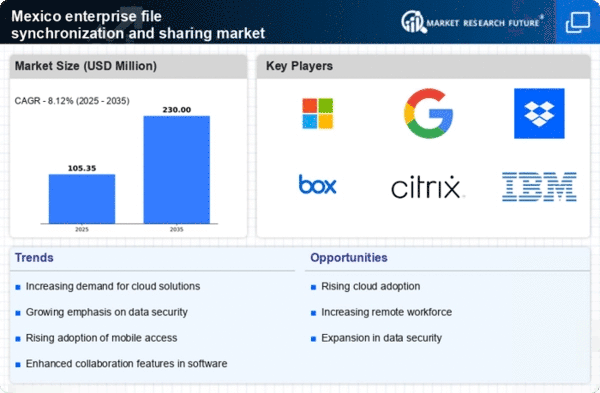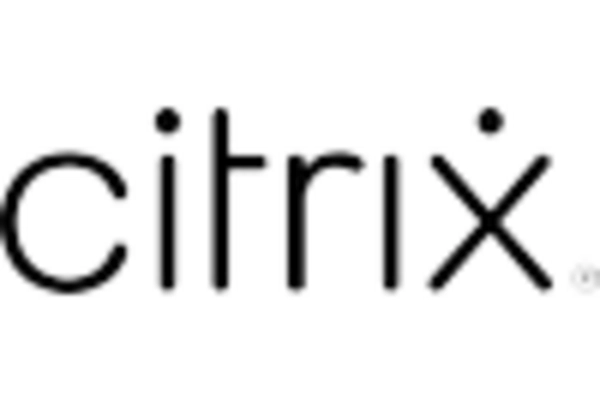Rising Demand for Remote Collaboration
The enterprise file-synchronization-sharing market in Mexico experiences a notable surge in demand for remote collaboration tools. As organizations increasingly adopt flexible work arrangements, the need for efficient file-sharing solutions becomes paramount. In 2025, it is estimated that approximately 70% of companies in Mexico will implement remote work policies, driving the necessity for secure and reliable file synchronization. This trend indicates a shift towards digital collaboration, where employees require seamless access to files from various locations. Consequently, vendors in the enterprise file-synchronization-sharing market are likely to enhance their offerings to cater to this growing demand, ensuring that businesses can maintain productivity and collaboration regardless of physical location.
Increased Investment in IT Infrastructure
In Mexico, the enterprise file-synchronization-sharing market is positively impacted by increased investment in IT infrastructure. As businesses recognize the importance of digital transformation, they are allocating more resources towards upgrading their technological capabilities. In 2025, it is projected that IT spending in Mexico will grow by 10%, with a significant portion directed towards file synchronization and sharing solutions. This investment is likely to enhance the overall efficiency and security of file management systems, enabling organizations to adopt more advanced solutions. The enterprise file-synchronization-sharing market is thus expected to benefit from this trend, as companies seek to leverage improved infrastructure for better collaboration and data management.
Regulatory Compliance and Data Governance
In Mexico, the enterprise file-synchronization-sharing market is significantly influenced by the increasing emphasis on regulatory compliance and data governance. Organizations are compelled to adhere to stringent data protection laws, such as the Federal Law on Protection of Personal Data Held by Private Parties. This legal framework necessitates that businesses implement robust file-sharing solutions that ensure data security and compliance. As a result, the market is projected to grow by 15% annually as companies seek solutions that not only facilitate file synchronization but also align with regulatory requirements. This driver highlights the critical role of compliance in shaping the enterprise file-synchronization-sharing market landscape.
Growing Importance of Data Backup Solutions
The enterprise file-synchronization-sharing market in Mexico is witnessing a growing importance placed on data backup solutions. As organizations recognize the potential risks associated with data loss, the demand for reliable backup systems is increasing. In 2025, it is estimated that around 60% of businesses will prioritize data backup as a critical component of their file-sharing strategies. This trend indicates a shift towards comprehensive data management practices, where companies seek solutions that not only facilitate synchronization but also ensure data integrity and recovery. Consequently, the enterprise file-synchronization-sharing market is likely to expand as vendors enhance their offerings to include robust backup functionalities.
Technological Advancements in File Management
Technological advancements play a crucial role in shaping the enterprise file-synchronization-sharing market in Mexico. Innovations such as artificial intelligence and machine learning are increasingly integrated into file management solutions, enhancing their functionality and user experience. In 2025, it is anticipated that 40% of enterprises will adopt AI-driven file synchronization tools, which can automate processes and improve data organization. This trend suggests that as technology evolves, businesses will seek more sophisticated solutions that not only streamline file sharing but also enhance security and efficiency. The enterprise file-synchronization-sharing market is thus likely to witness a transformation driven by these technological advancements.
















